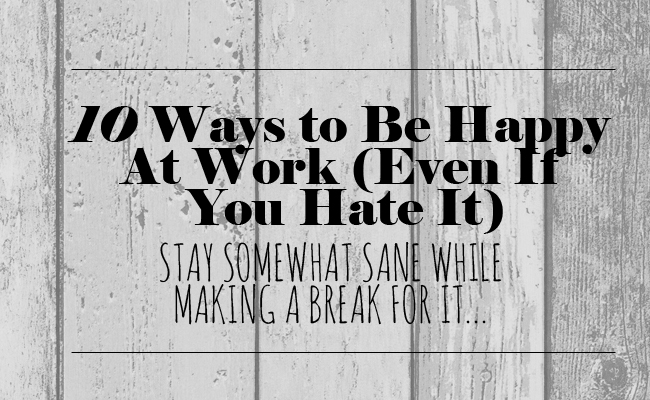
In my life I have walked out of three jobs: a bank, a call centre and a themed pizza restaurant. And yes, when I say walked I do mean stood up, coat on, bag over the shoulder and left.
Irresponsible? Totally.
Utterly miserable? You bet.
But I’m going to defend myself okay? I was young, I didn’t know anything about the world of work.
It does amuse me when people say ‘school prepares you work’, I disagree. I think for the majority of us it does nothing apart from ‘here’s the next system you enter and the rules that you must follow’, of course your experience may be different.
Educators agree that happy pupils learn better, what happens when we enter the 9-5? Goodbye happiness?
The bank was the worst, crying on the way there every morning was not good for the old mental health.
The last two were jobs I held as a student: the call centre I refused point blank to put my hand up to use the loo (rebel) and the themed pizza place is laughable, apparently ‘ I’m the worst waitress ever’, according to the manager. Personally I didn’t think I was that bad.
There are millions of people doing exactly what I was paid to do and even though I hated it, they don’t. Which makes me want to ask you, is happiness at work the responsibility of the employer or you, the employee?
The Other Side of The Coin
Fast forward a few (many) years and the last role I had where someone else paid my salary was fun, employee happiness was considered important, creativity and play was encouraged. Not at Google, I may add, a non-profit in Edinburgh.
Play was encouraged?
Yes. How novel, huh? Being told to play and get creative at work.
Was the work done? Yes, and people actually enjoyed doing more with no grumping or bitterness. Having the creative freedom meant the team were always devising better solutions, programs and ways of doing things.
Can we be happy at work, even if we hate it?
My answer? No job is meant to make you unhappy, period. I’ve worked with enough adults on employability and vocational programs who were emotionally destroyed by negative, belittling, unhappy, stressful and one-size fits all ‘institutional’ work environments.
However (and believe me it’s a BIG however) there are a few things that you can do to reclaim your sanity and happiness.
To me, work is a social place, and yet the majority of workplaces are sequenced, controlled, compartmentalised and standardised, not much has changed since the workhouses of the Industrial Revolution.
Generally speaking:
- You are expected to sit or stand all day long.
- You are expected to be a working machine, not a complex mix of mind, body and spirit.
- You are expected to leave your emotions at the door.
- You are expected to solve problems and strategically plan for people who act like School Masters.
- You are expected to follow rules, policies and regulations which don’t help you, but just reminds you that your a cog in a very big machine.
- You are expected not to voice concern or raise objections, otherwise you rock the foundations of the institution.
Don’t get me wrong, I know all workplaces aren’t like that, but for those that are, in my opinion, rob you of the joy of making a difference, a contribution and exercising your full potential.
Looky look, the chances are, if you have past the point of no return in your career or current role, a move is on the cards anyway. How do I know that? Because the misery isn’t sustainable. You may change career, you may opt for a new wallpaper at work: which won’t solve the long term misery but at least for a while you’ll be happier as you’ll be learning new things, ideas, meeting new people and so on.
So, take these tips as an ‘in the meantime’ lessons, your call if you try them:
1. Define your own definition of work happiness and satisfaction
What does being happy mean to you? What about work satisfaction? Is it flourishing? Is it belonging and feeling valued? Is it achieving? Is it seeing a task to completion? Seeing a customer or client smile, is that a priority? Everyone has a different defintion of the word happiness. Start with these questions as a baseline. Is there anyway you can bring them into your current role? Even if the boss and management couldn’t care, do you care enough to take full accountability for your happiness?
2. No two days are ever going to be the same
What I learned from the bank was I approached each day in the same way. I had already decided how the day was going to go before I even got there (Read: The Pits. Devils Hall) At every opportunity see each day as a new day, each interaction and communication as new, every event as new. I’m asking you to take a massive mindset shift, you can do it, you are much stronger than a role or what you ‘do’, you and I can choose how we want to feel and our state of mind in a second.
3. Be your best
At what you do. Look for ways to give it your all. Hate the bosses and management? Then do it for customers and clients. Start setting your own high standards. Being the best is not competition, it’s about recognising and being proud of your own skills and abilities. Use them. Excellence, the tiny things will make you happy, even if the company doesn’t raise a smile.
4. Play
Be creative, even if it’s not encouraged. Play isn’t just reserved for children. It doesn’t even have to be childlike. Some organisations try to change their working environment to the benefit of employees, but does putting in a gym or a creative room cut it though? Do benefits create happier work environments?
- Play and happiness isn’t a tactic or a system.
- Work happiness isn’t a set of rules to be followed or forced.
- It’s not reserved for team away days or for you to ‘learn’ on a training course you’ve been sent on.
A happy work environment isn’t about resources and objects it has to become part of the mission: it’s all encompassing and is the culture of the organisation.
Here’s the thing, you are the culture. You may not think you are but if an organisation is paying you for your skills, then you shape the culture. Yes, I know you may disagree with me, you may feel you have no power or status when it come to making decisions in a large company. But you do. Read number 3 again.
5. Create your own standards of excellence
You have the power to decide and write your own personal standards. What personal rules can you live with at work? What’s negotiable and non-negotiable? But I hate it, you cry. Okay, I get it, honest I do. Be exceptional anyway. Don’t let something you are paid for lower your capability for displaying excellence, you are worth more.
6. Be the person you would love to work with
Speaks for itself. Its’ so easy to get caught up in the negativity and pessimism of others. When the role no longer fits who you are, it’s pretty common to moan, grump and be the misery. Think about your ideal workmate: what qualities would they have, how would they treat others, how would they speak, be them. If you recognise the qualities, you have them.
7. Be engaged and engaging
With honesty and genuineness be interested in other people, be approachable and warm. Listen to understand, be empathic. Make people feel important, but do it with sincerity.
8. Play outside of work
Important —> Recognise you are not your job, you are not your career or what you get paid for. Take accountability for your happiness outside work. If you are thinking of a move, can you volunteer in the field you ultimately want to work in? Can you take weekend courses? Can you build in more time with your friends?
9. Give thanks and appreciation + recognise/acknowledge great work
Even if the organisation or culture doesn’t do it, you can. Acknowledge other people and the work they do: if it’s great, tell them. If you spot something that was a great idea, say so. Appreciate the good moments, be there, be present, say thanks, be the person that is creating a new culture.
10. Be altruistic
Give without expecting nothing in return. What! Yeah, toughie for most of us. Try it for a month. Just try. Don’t be a pushover though, that’s not being altruistic. Altruism is about being motivated to give something in return for nothing, but not of duty or loyality.
Will those tips make you love your role again?
(Smiling!) I don’t know. I do know (my experience) when I accept total responsibility and accountability for how I feel, shifts are made. You’ll know what’s on the cards for your career, whether you need a complete change or not. I’m suggesting to you, try it, it’s your call though, okay? And if you are utterly miserable and beyond the above list, action, decide today that you are in transition and begin the journey. You are the common factor in all this, you may not get to where you really want to go overnight, begin the process, start.
Your Wisdom Please
Any tips for being happy at work (even though you hate it?) Lessons from the past? Something you are doing now? Please leave a comment below.
Lastly if you need a little help to find and do the work you love there’s a course that does just that.
Did you like this article? Please feel free to share it with your friends below:
 They left for work this morning in a mood.
They left for work this morning in a mood. I’m sure it’s happened to all of us.
I’m sure it’s happened to all of us.


 Human brains have a very short attention span.
Human brains have a very short attention span.